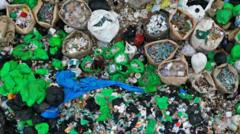Countries around the world have once again faltered in their attempts to establish a comprehensive treaty to tackle the urgent issue of plastic pollution, following a two-year negotiation process. In South Korea, representatives from over 200 nations gathered expecting to reach a critical agreement, but conflicting interests led to a breakdown in talks. Nearly 100 countries with ambitious environmental goals argued for significant reductions in plastic production, while delegates from oil-rich nations expressed concerns about the economic implications of such measures.
During the negotiations, Kuwait’s representatives emphasized the value of plastic to global development, stating that the objective should focus on controlling pollution rather than completely phasing out the substance, which they argue has significant societal benefits. This sentiment reflects longstanding disagreements since a consensus was reached in 2022 to pursue a global treaty focused on addressing plastic waste, particularly its damaging effects on marine ecosystems.
The United Nations reports that more than nine billion tonnes of plastic have been produced globally since 1950, with less than 10% effectively recycled. The alarming reality is that millions of tonnes find their way into oceans and seas, endangering wildlife as marine animals become entangled in or ingest plastic debris.
Faced with a pressing environmental crisis and its contribution to climate change—responsible for an estimated 5% of global greenhouse gas emissions—countries engaged in the Busan meeting could not resolve key disputes. A pivotal point of contention arose over Article 6 of the proposed treaty, determining whether it should enforce legally binding commitments to decrease plastic production or simply enhance recycling efforts.
In a passionate address, Camila Zepeda, representing a coalition of 95 countries—including the UK, the European Union, and several South American nations—pleaded for action, highlighting the urgent expectation of their citizens to shield the environment from plastic pollution. However, representatives from oil-producing nations such as Saudi Arabia and Iran vehemently opposed the proposed cuts to production, fearing it would exacerbate economic disparities and hinder their development.
Concerns surrounding the fossil fuel industry's significant influence on the negotiations were voiced by environmental organizations and scientists alike. A report by InfluenceMap indicated that the petrochemical sector intervened extensively during the treaty discussions, often opposing measures to limit production. Despite this, support for universal regulations from prominent plastic manufacturers, including Unilever and Nestlé, provided a glimmer of hope.
Nestlé's global public affairs lead for sustainability, Jodie Roussell, expressed disappointment at the missed opportunity for consensus, stressing that delays hinder crucial actions to combat plastic pollution and deter necessary business investments.
As countries look towards reconvening next year for further negotiations, calls for the coalition of 95 to pursue independent treaties have gained traction. Eirik Lindebjerg of the World Wide Fund for Nature (WWF) argued for the necessity of catering to the desires of the majority, reinforcing that a successful treaty could have far-reaching effects on plastic pollution eradication. The stakes remain high as global plastic production continues to increase, with projections indicating a tripling of waste entering oceans by 2040 unless decisive action is taken.
















